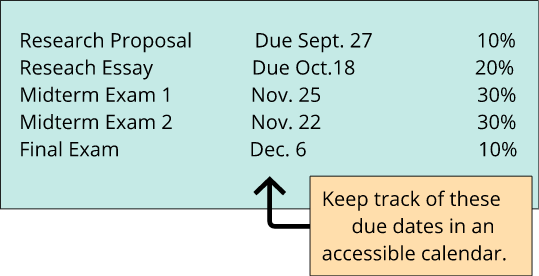4
A course syllabus (sometimes called a course presentation or course outline) is prepared by your instructor, and is like a roadmap for your learning journey ahead. You will want to look at your course on Blackboard before the course starts to see if it is available to you. While not every instructor may use Blackboard to a great degree, most do.
Course Syllabus include the following:
- Course Description:
Description from the Course Outline, plus anything else the Instructor would like you to know about the overall intention of this course.
This is the general overview of what you will be doing in this course.
- Contact Information:
Instructor name, email, phone, classroom, office hour times, office location.
This should contain all the information you need to contact your instructor when you need to ask questions, meet with them, or share information with them.
- Course Materials:
Required and Additional Materials. These may include: reference to handouts, library materials that are used in the course, or other materials.
You will need all of these items. Get them from the indicated sources. To begin your semester in the best possible manner, you will want to purchase or rent any required textbooks before the first day of class.
- Tentative Schedule of Topics, Classes, and Assignments (may change):
Including times, attendance requirements, external activities, field trips, etc.
This information should go into your scheduling device (planner, calendar, online schedule, etc.). In the next chapter, you will learn strategies to create a semester and weekly schedule based on the information in your course presentation.
- Assignments:
Assignments and due dates specified, may include rubrics / checklists.
Assignment due dates need to be scheduled in advance so you can plan your work, research, and study. Your course presentation may also include some guidelines and rubrics that indicate what is required for each assignment, and how the assignments will be graded. Rubrics and checklists must be referenced for projects to ensure that you meet the specified criteria.
- Tests and Exams:
Exam dates, may include other ways that testing will be done.
Put these test dates into your calendar as soon as you receive them. You will use this information to plan your study times, so you are well prepared for any tests, and can avoid cramming at the last minute.

- Policies:
University policies regarding class conduct, evaluation, testing, late assignments, and plagiarism are observed for all courses. Everyone at UVI must comply with the policies stated in the Student Handbook, Catalog, and other official University manuals. It is your responsibility to become acquainted with all University policies that pertain to you.
By getting to know your course syllabus, you can help to prepare yourself to meet the expectations of the semester ahead.
Try It!
Find a course syllabus for one of your classes. Using the syllabus (and Blackboard) try to find the following information:
- How to contact your instructor.
- What textbooks or course materials you will need before the first day of class.
- What assignments you will need to complete and what will be required.
- When your tests and exams are scheduled.
If you have any questions about what you read, e-mail your instructor, or plan to visit them in their office hours.
Download a printable worksheet to guide you through this process.
Licenses and Attributions:
Content previously published in University 101: Study, Strategize and Succeed by Kwantlen Polytechnic University, licensed as CC BY-SA.
Adaptation: Changed wording to reflect more common U.S. usage.
